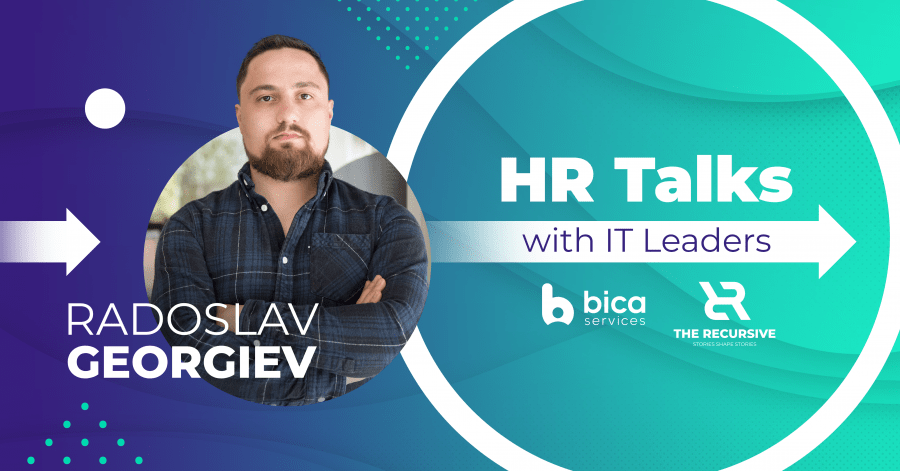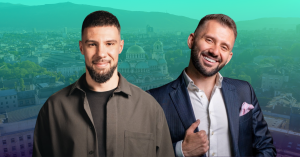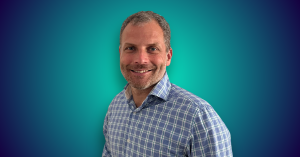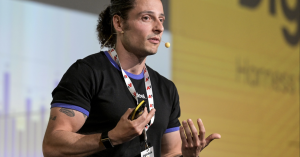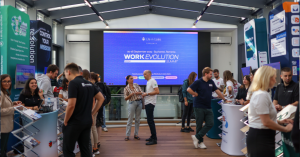HR Talks with IT leaders is a campaign organized in collaboration between The Recursive and BICA Services, one of the most prominent HR service providers in the Bulgarian market. Our goal is to give more visibility to the knowledge of how great tech teams are built. Every week, we will meet with accomplished entrepreneurs and managers who will share their personal experience and what’s their approach to leadership, communication, hiring, talent development, and much more.
For the second article of our series, we talk to Radoslav Georgiev – CTO and co-founder of Gtmhub – a software scaleup that helps businesses orchestrate strategy and deliver results with Objectives and Key Results (OKRs). The firm, which has offices in Sofia, Berlin, London, Paris, and Denver, was established in 2015 to become one of the fastest-growing tech companies in Bulgaria. In the beginning of 2021, Gtmhub announced its $30M Series B round led by American VC Insight Partners, which was followed by a $120M Series C in December, led by Index Ventures.
What’s the number one lesson about leadership you have learned over the years with Gtmhub?
We started from a small garage in Gorublyane, an industrial neighborhood in Sofia, and since then our team has grown to more than 200 people. In a company that is developing and evolving at such a rapid pace, I learn a new leadership lesson every day.
The most important lesson I have learned so far is that leaders must trust the people they work with and be certain that they are the best in what they do. I found out the hard way that micromanagement is harming the organization – the best way to solve problems is through open team discussion, ensuring that every team member’s views are heard and taken into account.
On a personal level, I have acknowledged the fact that a co-founder or a team leader does not have to necessarily know the optimal solution to a problem – one only needs to believe in the experts he/she works with and demonstrate trust and willingness to communicate.
From your experience in the past couple of years, what are the biggest challenges that lie on the path of a technological company’s successful and fast scaling?
One of the biggest challenges a company faces while growing is the dilution of its company culture. In the beginning, it was very easy for us to agree on a set of values and stick to them – our founding team shared a very similar mindset, so this helped us be efficient and productive in the very early stages. Later on, when we started recruiting our first team members, the story was somewhat similar – the first people we hired were people we had worked with before. We knew they were aware of our success criteria and would be a good fit for the company.
After exhausting our personal connections, we started recruiting people we hadn’t known previously. This posed a challenge as we had to assess whether new job candidates will be able to contribute to the vision and mission of Gtmhub. We dealt with the situation by having all team members participate in the development of our company culture. During Gtmhub’s first team building in 2019, we (around 30 people at the time) took the time to discuss and outline the core values and goals of Gtmhub – it is then that we agreed on strategy and expectations.
Now that we are a little over 200 people, I am not able to pay as much attention to the prospective hires as before but I believe in the sound judgement of my colleagues. After having participated in around 100 interviews in the first two quarters of 2021, I decided to stop as I did not have enough time to spare. Even when I used to take part in the recruitment process as a CTO, I would leave the ultimate hiring decision to the respective hiring manager as I believed they knew how to choose their future colleagues better.
+++ HR Talks with IT Leaders ep. 1: Boyko Iaramov on giving back, transparency and leadership
What do you look out for in order to recognize the right people for your teams and culture?
I always seek to understand the person’s approach towards a potential problem or a challenge in their prospective role. Assessing the skillset and testing one’s experience is easy – we have a set of tools, including theoretical and personality tests, practical tasks, and interviews in which we initiate discussions on concrete problems. In contrast, it requires more effort and attention to understand whether a candidate shares the mental aptitude required for serving the needs of the company, all while feeling comfortable in our environment.
I believe that a recruitment process is not one-sided – an employer must see whether the candidate can serve the company well, but the recruiters also have to demonstrate what the company can offer to the individual.
What is the type of people that would feel comfortable at Gtmhub?
People who love to work autonomously and are self-starters. We value people who take instant actions to solve a problem that has just arisen. This is the type of people who would react immediately when an issue comes up and report their achievements, all the while suggesting ways for improvement of already existing operational procedures. The ideal candidate is a self-sufficient individual – in contrast to well-established enterprises, a startup, such as ours, cannot allocate the time and resources to deal with every problem.
This is common for startups – every team member wears more than one hat, so people should not be afraid to fail when out of their comfort zone. At Gtmhub, we embrace individuals who are willing to step outside of their domains of expertise. As a CTO and one of the main software engineers, I also had to complete accounting and marketing tasks in the past.
Finally, I must say that we do not penalize mistakes – instead, we try to extract a lesson from every situation and strive to not repeat the mistake – this is why we also need quick learners that can easily adapt.
In the second part of this interview, we explore Radoslav Georgiev’s tips on employee onboarding, staying focused, and how he would measure his success as a leader moving forward.

